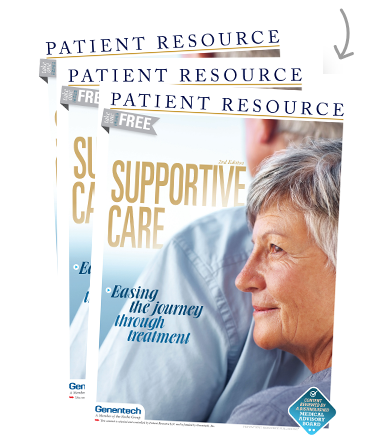Anemia
Anemia is an abnormally low number of red blood cells in your bloodstream. The low number of these cells means there is not enough hemoglobin (an iron protein), the part of the red blood cell that carries oxygen from your lungs to the rest of your body. When anemia is moderate to severe, the body tissues do not get enough oxygen.
- Fast heartbeat
- Shortness of breath
- Dizziness
- Feeling chilled
- Chest pain
- Swelling in the hands and/or feet
- Pale skin
These symptoms usually occur gradually and get worse as the hemoglobin level decreases.
What causes anemia?
Anemia occurs when the bone marrow or kidneys are damaged from cancer or its treatment, which reduces red blood cell production. Treatments that can increase the risk for anemia include chemotherapy, immunotherapy and radiation therapy.
Platinum-based chemotherapy drugs may damage the bone marrow or tissues in the kidneys that help produce erythropoietin, which is naturally produced in the kidneys and stimulates bone marrow to make red blood cells. Risk of anemia also increases when chemotherapy is combined with radiation therapy, particularly when radiation is directed at certain bones rich in bone marrow (such as the pelvis, legs, chest or abdomen).
Certain types of cancer can also cause low numbers of red blood cells, which damage bone marrow.
Other causes include nausea, vomiting and loss of appetite, which may deplete the nutrients your body needs to produce red blood cells, such as iron, vitamin B12 and folic acid. Too much blood loss from surgery or a tumor causing internal bleeding can also result in anemia.
When does anemia typically occur?
Anemia related to drug therapy can occur any time during treatment. It is usually corrected within one to two weeks after treatment ends.
Your health care provider will measure your hemoglobin level during your treatment, and if the level is too low, treatment may be delayed until it increases. Anemia may be managed in several ways, depending on the cause. The goal is to increase the hemoglobin level, and this will alleviate symptoms. Medication, increasing the iron and folic acid in your body with supplements or food, or a blood transfusion may be recommended. Exercise, such as walking, has been shown to increase the hemoglobin level in your blood.
How you can manage anemia
Your health care provider may recommend supplements and vitamins you can take to increase your iron levels, including iron, folic acid or vitamin B12. An over-the-counter iron supplement may help, but you should not take a supplement without consulting your health care provider. Eating foods high in iron, which include green, leafy vegetables; dried fruit; seafood, chicken and beef; eggs; and nuts may also help. Foods high in folic acid include asparagus, broccoli, spinach, lima beans and enriched breads and cereals.
If you are experiencing fatigue caused by anemia, consider the following.
- Conserve your energy. Choose to do the most important tasks each day. If people offer to help, let them.
- Strive for a consistent sleep schedule. Taking short naps may help, but too much sleep may make you feel weak.
- Exercise. A daily short walk or brief exercise may be helpful.
- Eat nutritiously. Consult a registered dietitian for assistance.
When to call your health care provider
Ask about the risk of anemia with your treatment plan. Call your health care provider if you feel extremely tired and weak; feel dizzy or short of breath or have difficulty breathing; and/or experience a rapid heartbeat, heart palpitations or chest pain.



